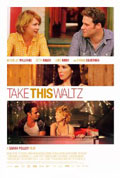
Directed by
Sarah Polley
116 minutes
Rated MA
Reviewed by
Sharon Hurst

Take This Waltz
Synopsis: Margot (Michelle Williams) is a 28-year-old aspiring writer married to amiable Lou (Seth Rogen) who is researching and writing a chicken cookbook. Five years into their marriage they appear to love each other very much but don’t always have a lot to talk about. Margot meets Daniel (Luke Kirby) on a flight and discovers to her astonishment that he lives across the street from her. Their attraction is instantaneous and the certainty of Margot’s life is soon at risk.
Director Sarah Polley has an intuitive female approach to her subject matter that really strikes a chord with me. Her 2006 directorial debut Away From Her was an achingly beautiful look at the descent of a woman into Alzheimer’s. This film goes to the opposite end of the spectrum - the time in a woman’s life when she is first smitten by overwhelming desire and the devastating effect it can have on her. Because a film of this nature is so much about emotions, often unarticulated ones, its success or otherwise will rely upon the ability of the actors to convey what is going on within the hearts of their characters. This is achieved in bucket loads.
Williams is one of the finest young actresses around today. Her Margot is a complex character. When we meet her in the opening scene (which also closes the film) she is baking, with a mixture of world-weary ennui, resignation and a deep sense of underlying malcontent. Her relationship with Lou is one that seems grounded in childlike interactions – they speak in babyish voices, play child-like finger-wrestling games, and their physical contact is more worthy of 80-year-olds than young marrieds - love but little passion. When she meets Daniel her fear of being in between things and of wondering what she may be missing out on surges in a wave of mutual yearning, made all the more erotic by its forbidden nature and its non-consummation. Kirby is just the sort of devastatingly handsome and charismatic bloke to play his role, a stark contrast to the very out-of-character Seth Rogan in what is the performance of his career to date. As Lou he is warm, loving, and vulnerable – just what many women would see as the perfect husband, the sort of fellow one wants to get old with, just maybe not to be young with.
Polley makes great use of physical surrounds. Lou and Margot’s home is crammed with claustrophobic family photos, (and sometimes Lou’s actual rowdy family) and a fan constantly blows as if to cool Margot’s simmering passion. Toronto is shown at its colourful summer best in a and with Margot’s light summer frocks and Daniel’s rickshaw (which he pulls to make money to support his passion for painting), there is a heady feel which echoes the heat of suppressed desire. Similarly, when Margot and Daniel spend a day at an amusement park and go on a crazy ride, the music plays and camera swirls we feel the magic of first love, along with Margot’s confusion and the fear that she may hurt Lou. As well as being visually beautiful, the film has some wonderful bits of dialogue, all written by Polley, especially one splendidly erotic scene in which Daniel seduces Margot with words alone.
I’m unsure if this is a film that women will relate to more than men. Certainly anyone who has ever felt intense longing and overwhelming passion, coupled with the fear of losing the known and comfortable, will get what Polley is saying. My one criticism is the injection towards the film’s end of a couple of scenes that seemed superfluous and did nothing to propel the themes forward.
Structurally the film invites the viewer to go along with Margot on her journey and to empathise with the three main characters. Whether you feel she is foolish in her decisions will perhaps depend on your own life experience but if you’ve ever wondered how desire looks when translated to the screen (and mostly with clothes still on!), this is the film for you. Captivatingly delicate and sensitive, Take This Waltz indeed.

Want more about this film?


Want something different?




